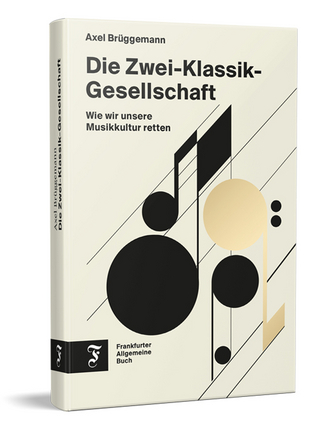
Rethinking Brahms
Oxford University Press Inc (Verlag)
978-0-19-754173-9 (ISBN)
As one of the most significant and widely performed composers of the nineteenth century, Brahms continues to command our attention. Rethinking Brahms counterbalances prevailing scholarly assumptions that position him as a conservative composer (whether musically or politically) with a wide-ranging exploration and re-evaluation of his significance today. Drawing on German- and English-language scholarship, it deploys original approaches to his music and pursues innovative methodologies to interrogate the historical, cultural, and artistic contexts of his creativity. Empowered by recent theoretical work on form and tonality, it offers fresh analytical insights into his music, including a number of corpus studies that interrogate the relationships between Brahms and other composers, past and present.
The book brings into sharp focus the productive tension that exists between the perceived fixedness of musical texts and the ephemerality of performance by considering how historical and modern performers shape established understandings of Brahms and his music. Rethinking Brahms invites the reader to hear familiar pieces anew as they are refracted through historical, artistic, and philosophical prisms. Bringing us up to the present day, it also gives sustained attention to the resounding impact of Brahms's compositions on new music by exploring works by recent composers who have engaged deeply with his oeuvre. Combining awareness of overarching contexts with perceptive insights into Brahms's music, this book enlivens our understanding of Brahms, providing a dynamic, multifaceted, complex, and invigoratingly fresh portrait of the composer.
Nicole Grimes is Associate Professor of Music at the University of California, Irvine. Her books include Brahms's Elegies: The Poetics of Loss in Nineteenth-Century German Culture, Rethinking Hanslick: Music, Formalism, and Expression (co-edited with Siobhán Donovan and Wolfgang Marx), and Mendelssohn Perspectives (co-edited with Angela Mace), and numerous articles and chapters on the music of Brahms, Clara Schumann, Robert Schumann, Schoenberg, Liszt, Wolfgang Rihm, and Donnacha Dennehy. Her research has been funded by a Marie Curie International Fellowship from the European Commission, the Deutscher Akademischer Austauschdienst, and the Irish Research Council for the Humanities and Social Sciences. She is currently at work on a large-scale analytical project on the music of Emilie Mayer (1812-1883). Reuben Phillips is a British Academy Postdoctoral Fellow at the Faculty of Music in Oxford. He was a doctoral student at Princeton University and was awarded the Karl Geiringer Scholarship of the American Brahms Society for his PhD dissertation that explored Brahms's engagement with German Romantic literature. He has been the recipient of research grants from the Deutscher Akademischer Austauschdienst, the Staatliches Institut für Musikforschung in Berlin, Edinburgh University's Institute for Advanced Studies in the Humanities, and of an Edison Fellowship from the British Library. In addition to his work on Brahms, he has written articles on the British music scholar Donald Francis Tovey and the exhumation and reburial of composers in late nineteenth-century Vienna.
Contributor Biographies
Introduction
Nicole Grimes and Reuben Phillips
Part 1: Intellectual Contexts
1. Brahms in the Schumann Library
Reuben Phillips
2. Johannes Brahms, Connoisseur of Graphic Arts
Styra Avins
3. Settling for Second Best: Brahms's Männerchor-Lieder in Historical Context
David Brodbeck
4. Hearing and Seeing Brahms's Harps
Jane Hines
Part 2: Rehearing Brahms
5. Brahms and the Unreliable Narrative
Janet Schmalfeldt
6. The Transmission and Reception of Courtly Love Poetry in Late Folksong Settings by Johannes Brahms, Friedrich Wilhelm Arnold, and Wilhelm Tappert
Loretta Terrigno
7. Rehearing Brahms's Late Intermezzi: The Eternal Recurrence of Reflection
Tekla Babyak
8. Joachim and Brahms in the Spring and Summer of 1853: Formative Influences and Performative Identities Reconsidered
Katharina Uhde
9. Doesn't Play Well With Others: Performance and Embodiment in Brahms's Chamber Music with Piano
Anna Scott
Part 3: Analytical Perspectives
10. First-Theme Syntax in Brahms's Sonata Forms
Julian Horton
11. Formal Elision in the Chamber Music of Mendelssohn and Brahms: A Case-Study in Romantic Formenlehre
Benedict Taylor
12. Compositional Range versus Compositional Ideal Type: Some Reflections on Brahms and Dvo?ák
Peter H. Smith
13. Intentional Transgressions: Transformation and Prolongation in Selected Works by Brahms
Frank Samarotto
Part 4: Monuments and Memorialization
14. Images, Monuments, Constructs: Johannes Brahms in the Culture of Remembrance
Wolfgang Sandberger
15. Templates for Grief: Brahms's Requiem after the Dresden Firebombing
Martha Sprigge
16. 'Aimez-vous Brahms?' The History of a Question
Daniel Beller-McKenna
Part 6: Afterlives of Brahms
17. Brahms's Serious Songs in the Orchestral Imagination: Two Episodes in the Arrangement History of Op. 121
Frankie Perry
18. Hearing Rihm Hearing Brahms: Symphonie 'Nähe fern' and the Future of Nostalgia
Nicole Grimes
19. Spectres and 'Derangements': Michael Finnissy's Summonings of Brahms the Progressive
Edward Venn
Bibliography
Index
| Erscheinungsdatum | 21.10.2022 |
|---|---|
| Zusatzinfo | 80 b/w halftones, 700 line drawings |
| Verlagsort | New York |
| Sprache | englisch |
| Maße | 243 x 161 mm |
| Gewicht | 885 g |
| Themenwelt | Kunst / Musik / Theater ► Musik ► Klassik / Oper / Musical |
| ISBN-10 | 0-19-754173-9 / 0197541739 |
| ISBN-13 | 978-0-19-754173-9 / 9780197541739 |
| Zustand | Neuware |
| Haben Sie eine Frage zum Produkt? |
aus dem Bereich


